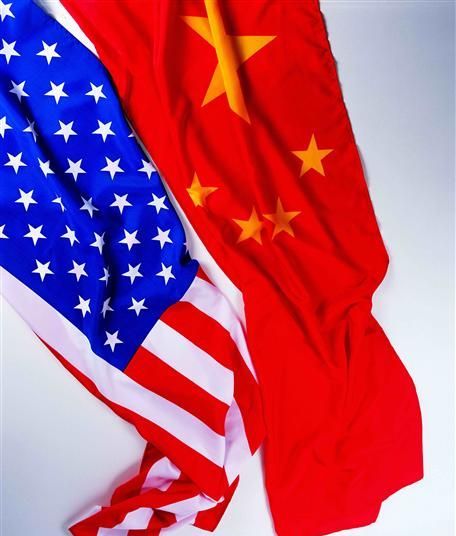中国经济面临关键决策时刻 China Faces Policy Crunch Time
Page 1 of 1
 中国经济面临关键决策时刻 China Faces Policy Crunch Time
中国经济面临关键决策时刻 China Faces Policy Crunch Time
From WSJ.com
对中国的决策者来说,是要保增长还是抑通胀的关键时刻就要到来。
中国10月份消费者价格指数(CPI)同比增长4.4%,高于9月份的3.6%,当月CPI的飙升意味着物价涨幅如今已经超出了令北京感到满意的区间,中国政府为2010年设定的CPI目标为3%。与此同时,中资银行发放贷款的速度比2009年放贷狂潮期间慢不了多少。10月份新增贷款为890亿美元。
中国央行已经开始收紧绳索的另一端了。在周四的数据公布前,它上调了存款准备金率,迫使银行将更多资金搁置一旁,而不是将其作为贷款发放出去。上个月它还上调了基准利率,此前它将利率维持在信贷危机之后的低点已将近两年。
更多的加息次数将是必要的。由于目前的通胀率高出银行支付的存款利率1.9个百分点,中国的储户认为他们存在银行里的钱实际上是在贬值的。结果不出意外,10月份的储蓄额降幅超过了1000亿美元,这也创下了纪录。储户寻找更好的投资方式是一种风险,因为它在某种程度上促成了资产价格泡沫。
但随着年底的临近,中国央行还得决定明年收紧信贷配额的力度。今年对于新增银行贷款的上限大约在1.1万亿美元。
从2008年末时银行开始大量放贷,这不仅仅是直接的财政刺激,它帮助中国度过了全球金融危机,而且如今依然保持着经济的高速增长。发放给国有企业和地方政府关联企业的贷款引发了大规模的投资,这反过来又促进了整体经济增长。
但正如Stone & McCarthy Research Associates的分析师欧乐鹰(Tom Orlik)所说,让经济增长这艘船在信贷海洋上保持行驶并不是件 容易的事。对决策者来说问题在于当信贷的闸门被关闭后经济是否还能继续高速增长──如果通胀持续高企,银行的不良贷款问题开始显现,信贷闸门将不得不关闭。
尽管有许多有关中国重新实现平衡的言论,短期内中国经济不会有能完全弥补信贷引导的投资水平猛然下降所带来的影响的驱动力,然而通胀必须要受到抑制。
对北京来说,2011年已经看起来麻烦不少了。
Andrew Peaple
For Chinese policy makers, a crunch moment in the trade-off between growth and inflation is looming.
A spike in China's consumer-price inflation in October -- the annual rate rose to 4.4%, up from 3.6% in September -- means price gains are now well above Beijing's comfort zone, given that the CPI target for 2010 is 3%. At the same time, China's banks are still pumping out credit at a rate that's not much slower than 2009's lending bonanza. October saw an additional $89 billion of new loans made.
The People's Bank of China is already pulling harder on the other end of the rope. Prior to Thursday's data, it raised its reserve requirement ratio, forcing banks to set more money aside, rather than lend it. Last month it raised benchmark interest rates, after keeping them at post-credit-crunch lows for nearly two years.
More increases will be necessary. With inflation now 1.9 percentage points higher than the deposit rate banks pay, Chinese savers are seeing the value of their holdings eroded. Unsurprisingly, deposit levels fell by more than $100 billion in October, a record pace.That depositors are looking for better places to put their money to work is a danger, because it helps fuel asset-price bubbles.
But with the year winding down, the central bank also has to decide how much it should tighten lending quotas for next year. The current year's cap on new bank loans is about $1.1 trillion.
Heavy bank lending from late 2008, more than direct fiscal stimulus, got China through the global financial crisis with still-high levels of economic growth. Money loaned to state-owned enterprises and local government-related entities spurred heavy investment, in turn propping up overall growth.
But, as Tom Orlik, an analyst with Stone & McCarthy Research Associates, says, keeping growth afloat on a sea of credit isn't much of a trick. The question for policy makers is whether economic expansion can continue at a high rate when the lending taps are turned off -- as they will have to be if high inflation persists and bad loans at the banks start to emerge.
Despite all the talk of China's rebalancing, in the near term the economy doesn't have the drivers to fully compensate for a sharp fall in credit-led investment. But inflation has to be tamed, too.
For Beijing, 2011 is already looking like a year of headaches.
Andrew Peaple
本文涉及股票或公司
Google Inc. (Cl A)
总部地点:美国
上市地点:纳斯达克
股票代码:GOOG
对中国的决策者来说,是要保增长还是抑通胀的关键时刻就要到来。
中国10月份消费者价格指数(CPI)同比增长4.4%,高于9月份的3.6%,当月CPI的飙升意味着物价涨幅如今已经超出了令北京感到满意的区间,中国政府为2010年设定的CPI目标为3%。与此同时,中资银行发放贷款的速度比2009年放贷狂潮期间慢不了多少。10月份新增贷款为890亿美元。
中国央行已经开始收紧绳索的另一端了。在周四的数据公布前,它上调了存款准备金率,迫使银行将更多资金搁置一旁,而不是将其作为贷款发放出去。上个月它还上调了基准利率,此前它将利率维持在信贷危机之后的低点已将近两年。
更多的加息次数将是必要的。由于目前的通胀率高出银行支付的存款利率1.9个百分点,中国的储户认为他们存在银行里的钱实际上是在贬值的。结果不出意外,10月份的储蓄额降幅超过了1000亿美元,这也创下了纪录。储户寻找更好的投资方式是一种风险,因为它在某种程度上促成了资产价格泡沫。
但随着年底的临近,中国央行还得决定明年收紧信贷配额的力度。今年对于新增银行贷款的上限大约在1.1万亿美元。
从2008年末时银行开始大量放贷,这不仅仅是直接的财政刺激,它帮助中国度过了全球金融危机,而且如今依然保持着经济的高速增长。发放给国有企业和地方政府关联企业的贷款引发了大规模的投资,这反过来又促进了整体经济增长。
但正如Stone & McCarthy Research Associates的分析师欧乐鹰(Tom Orlik)所说,让经济增长这艘船在信贷海洋上保持行驶并不是件 容易的事。对决策者来说问题在于当信贷的闸门被关闭后经济是否还能继续高速增长──如果通胀持续高企,银行的不良贷款问题开始显现,信贷闸门将不得不关闭。
尽管有许多有关中国重新实现平衡的言论,短期内中国经济不会有能完全弥补信贷引导的投资水平猛然下降所带来的影响的驱动力,然而通胀必须要受到抑制。
对北京来说,2011年已经看起来麻烦不少了。
Andrew Peaple
For Chinese policy makers, a crunch moment in the trade-off between growth and inflation is looming.
A spike in China's consumer-price inflation in October -- the annual rate rose to 4.4%, up from 3.6% in September -- means price gains are now well above Beijing's comfort zone, given that the CPI target for 2010 is 3%. At the same time, China's banks are still pumping out credit at a rate that's not much slower than 2009's lending bonanza. October saw an additional $89 billion of new loans made.
The People's Bank of China is already pulling harder on the other end of the rope. Prior to Thursday's data, it raised its reserve requirement ratio, forcing banks to set more money aside, rather than lend it. Last month it raised benchmark interest rates, after keeping them at post-credit-crunch lows for nearly two years.
More increases will be necessary. With inflation now 1.9 percentage points higher than the deposit rate banks pay, Chinese savers are seeing the value of their holdings eroded. Unsurprisingly, deposit levels fell by more than $100 billion in October, a record pace.That depositors are looking for better places to put their money to work is a danger, because it helps fuel asset-price bubbles.
But with the year winding down, the central bank also has to decide how much it should tighten lending quotas for next year. The current year's cap on new bank loans is about $1.1 trillion.
Heavy bank lending from late 2008, more than direct fiscal stimulus, got China through the global financial crisis with still-high levels of economic growth. Money loaned to state-owned enterprises and local government-related entities spurred heavy investment, in turn propping up overall growth.
But, as Tom Orlik, an analyst with Stone & McCarthy Research Associates, says, keeping growth afloat on a sea of credit isn't much of a trick. The question for policy makers is whether economic expansion can continue at a high rate when the lending taps are turned off -- as they will have to be if high inflation persists and bad loans at the banks start to emerge.
Despite all the talk of China's rebalancing, in the near term the economy doesn't have the drivers to fully compensate for a sharp fall in credit-led investment. But inflation has to be tamed, too.
For Beijing, 2011 is already looking like a year of headaches.
Andrew Peaple
本文涉及股票或公司
Google Inc. (Cl A)
总部地点:美国
上市地点:纳斯达克
股票代码:GOOG
Page 1 of 1
Permissions in this forum:
You cannot reply to topics in this forum